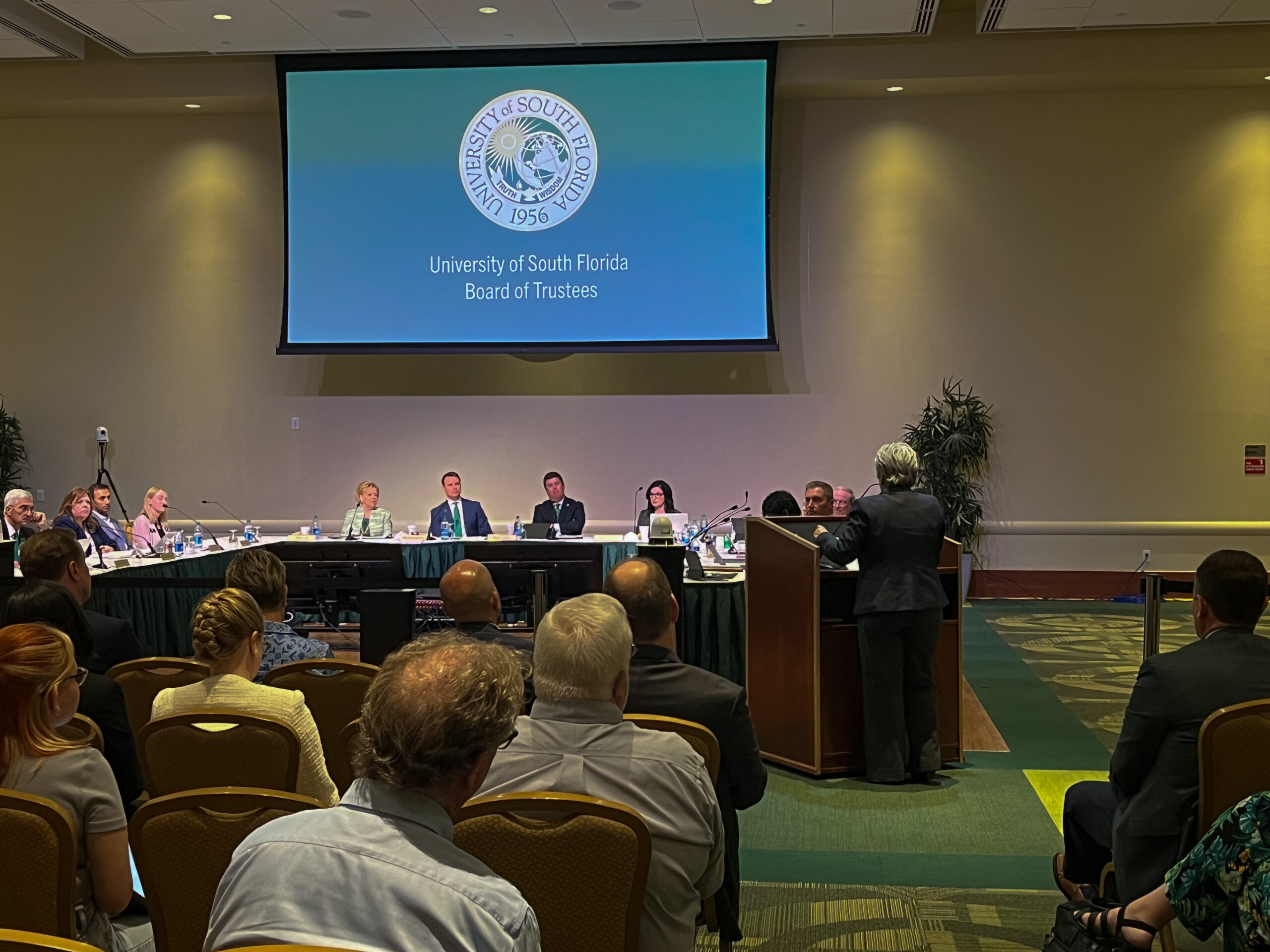BOT approves new collective bargaining agreement, hears public comments regarding state legislation

At Tuesday morning’s meeting, the Board of Trustees (BOT) voted to accept a 3-year bargaining agreement (CBA) with the American Federation of State, County and Municipal Employees (AFSCME) and listened to public comments from students and professors regarding House Bill (H.B.) 999.
During the 9:30 a.m. hour-long meeting in the Marshall Student Center Ballroom, the BOT also approved previously discussed agenda items such as the new on-campus stadium deal terms and increased housing rates.
Four University Police (UP) officers were posted at the room’s doors. UP Public Information Representative Michael Lavelle said this was a measure taken to ensure security was maintained for the entire building and to keep “everyone safe and aware.”
The AFSCME – a national union – currently has a memorandum of understanding (MOU) with the university and submitted a new, tentative three-year CBA. Changes made to the currently standing MOU relate to wage increases and are expected to have a financial impact of $4.7 million excluding benefits.
In year one of the accepted agreement, in-unit staff will be provided a 3% wage increase and a one-time targeted base wage increase to in-unit employees who are found to be eligible for competitive market adjustment by a university analysis, according to senior associate general counsel Liz Gierbolini. Under the agreement, the following years will consist of 2.5% base wage increases to in-unit staff.
Increases for year one of the CBA will be effective upon ratification by the BOT and consequent increases for year two and three will take effect on Oct. 1 of this year and Oct. 1, 2024, respectively.
All wage increases are dependent on employees meeting certain criteria such as not having “need improvement” or unsatisfactory ratings, according to the CBA. Employees must also not have a performance improvement plan and must be employed in their positions at the time of ratification by the BOT.
The board members also voted to consent to the new stadium deal terms and design phase as well as new student housing rental rates, which were previously discussed in the BOT’s Feb. 14 meeting.
Totaling to expenditures as high as $22 million approved by the BOT, the new 35,000-seat stadium is expected to be ready for use for the 2026 football season, according to the agenda.
A USF Housing and Residential Education proposal to increase on-campus housing rates was also approved by the BOT. The plan consists of a 4.5% increase in rates per year for five consecutive years and will be effective starting fall 2023 for the Tampa campus. It will have staggered implementation rates throughout all campuses, with the St. Pete campus seeing the increase in 2024 and Sarasota-Manatee in 2025, according to the BOT finance agenda.
Reasons for the increase included a general rise in costs due to inflation, the need for funding towards scheduled maintenance and capital improvements – including an Argos Redevelopment plan currently in its preliminary phases – and the fact that USF has not increased rates since 2019, according to a Feb. 28 Oracle article.
Once the BOT members finished discussing agenda items, the meeting was opened to public comment, where a total of five students and professors spoke on their concerns for the repercussions of H.B. 999 and called on the BOT to take action.
Initially introduced on Feb. 21, the bill consists of Gov. Ron DeSantis’ plans to push back against diversity, equity and inclusion (DEI) and critical race theory (CRT) initiatives in the state’s public universities and colleges. It has received backlash due to its possible impact on student organizations by groups such as Stand for Freedom (SFF).
Presenting a letter to the BOT with 30 student organizations’ signatures, Jonathon Chavez, senior political science major and member of SFF, said the bill represents a “blanket ban” on DEI and its derivatives. Focusing on the bill’s vague language and ambiguity, Chavez said it could cause limitations relating to the university’s funding of student organizations.
“[Student organizations] are the core of student life on campus. They are a means by which students can make friends and professional connections, develop hobbies and skills and all this while enriching their university experience to protect student life,” Chavez said.
BOT chair William Weatherford and faculty senate chair Jenifer Schneider thanked the students for their comments and said they encouraged others to reach out to their senate and house representatives.
Associate history professor Adriana Novoa, who filed a lawsuit against the “Stop Woke Act” alongside senior political science and philosophy major Sam Rechek, said there is a need for tenure and academic freedom, which is currently being threatened in the state. She said classrooms are filled with people from different experiences and backgrounds which requires equal representation in learning settings.
“The absence of tenure and academic freedom does not shield us from the capricious nature of political power,” Novoa said. “We need them because education can only be trusted when we have freedom from fear.”
Chavez said the board must take measures to insulate the university from the potentially devastating effects of H.B. 999 and asked they commit to upholding current classes and tenure protections.
“USF cannot meaningfully offer tenure while the state of Florida is simultaneously moving to undermine the value of that same offer,” Chavez said.
“Where there is legal ambiguity, there will be legal challenges. USF must be prepared for possible lawsuits against our school to bring all of those consequences to bear.”






